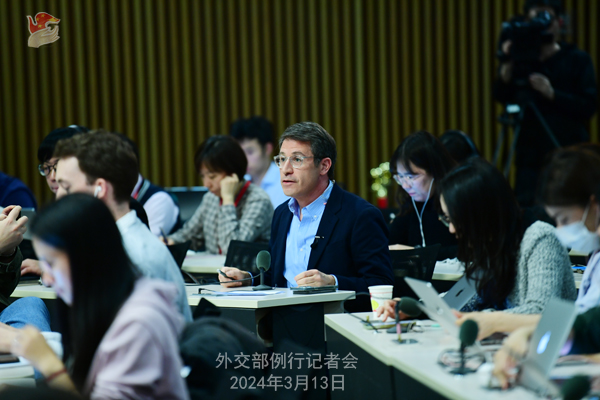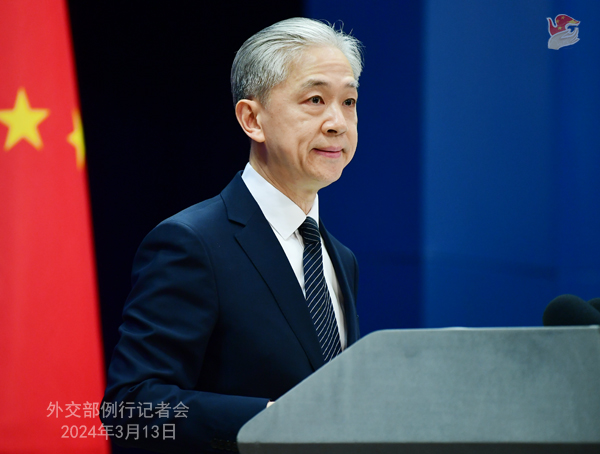
AFP: The Australian wine industry said today that the Chinese government is expected to lift anti-dumping tariffs on Australian wine soon. Can you confirm this? When will China make the relevant announcement?
Wang Wenbin: I’d refer you to competent authorities for your specific questions. What I can tell you is that for some time, China and Australia have engaged in dialogue and consultation to address each other’s concerns properly and jointly worked to realize a momentum of improvement and growth in bilateral relations. China stands ready to continue stepping up dialogue and cooperation with Australia under the principles of mutual respect, equality, mutual benefit and seeking common ground while shelving differences, so as to promote the steady and sound growth of China-Australia relations.
CNN: As you will know, lawmakers in the United States are voting to possibly ban TikTok. Regardless of what they may decide, what is your response to feelings of distrust from American lawmakers and the American public toward Chinese companies?
Wang Wenbin: In recent years, though the US has never found any evidence of TikTok posing a threat to the US’s national security, it has never stopped going after TikTok. Such practice of resorting to hegemonic moves when one could not succeed in fair competition disrupts the normal operation of businesses, undermines the confidence of international investors in the investment environment, sabotages the normal economic and trade order in the world and will eventually backfire on the US itself.
Reuters: US lawmakers are set to introduce legislation on Thursday to significantly expand government foreign investment reviews of real estate purchases by buyers from China and other foreign countries posing national security concerns. Does the Foreign Ministry have a comment on this?
Wang Wenbin: We’ve made clear China’s position on relevant issues before. We hope that the US can stop overstretching the concept of national security and stop its wrong practice of unjustifiably disrupting and suppressing normal economic and trade cooperation.
France 24: China is planning on selecting three French brandy brands for anti-dumping investigation. Why do you bring this up now and when do you plan on starting this probe?
Wang Wenbin: I’d refer you to competent Chinese authorities on your specific question. China’s position on relevant issues is consistent and clear. We hope that all sides can abide by the principle of fair competition, and the rules of market economy.
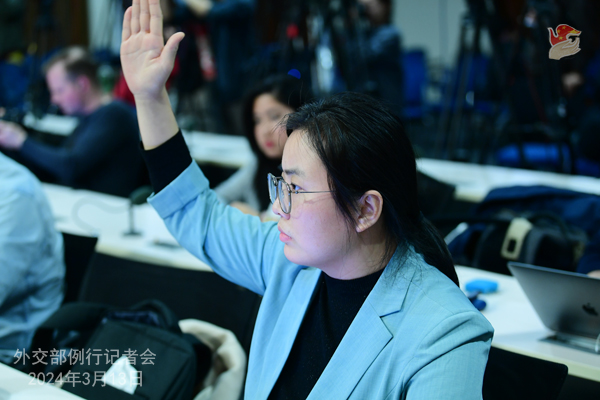
Hubei Media Group: The two sessions that has attracted great attention in the international community has come to a successful conclusion this week. Many in the international community said the two sessions is an important window for the rest of the world to observe and understand China’s democracy, and demonstrates the vitality of China’s whole-process people’s democracy. What’s your comment?
Wang Wenbin: The two sessions is an important platform to fully demonstrate and practice whole-process people’s democracy. This year marks the 70th anniversary of the National People’s Congress (NPC) and the 75th anniversary of the Chinese People’s Political Consultative Conference (CPPCC). Close to 5,000 deputies to NPC and members of the National Committee of CPPCC from all sectors across China gathered in Beijing to take into consideration the ideas and aspirations of over 1.4 billion Chinese in the top-level design of the party and national development, which showcased the great vigor of the whole-process people’s democracy.
Since the Party’s 18th National Congress, General Secretary Xi Jinping has had in-depth exchanges with deputies and members to discuss state affairs at the two sessions every year. He attended deliberations of delegations 59 times in total. He has taken the lead in practicing whole-process people’s democracy by soliciting suggestions extensively and pooling people’s wisdom.
When drafting the 2024 Report on the Work of the Government, the government, open to suggestions, pooled insights to fully reflect public opinion and respond to the concerns of communities, the public and businesses. Statistics show that around 10,000 people were directly involved in the report revision. After its completion, the draft was issued and sent to departments, institutions and all sectors across China for comment, drawing up over 1,100 suggestions. In addition, online media platforms picked up millions of online suggestions from over 40 countries and sent the picks to the drafters. The down-to-earth drafting with the collective wisdom incorporated peoples’ ideas and aspirations into major decisions on China’s development.
Deputies to NPC have actively practiced whole-process people’s democracy, developed closer bonds with the people, and better understood what policies people want and what their needs are through themed field trips, video talks, face-to-face discussions, inspection trips and other flexible ways. In this way, 230 proposals by NPC deputies were formulated, accounting for 77.2 percent of the total. A total number of 5,898 proposals were received by the CPPCC this year. Through the proposals, speeches at the CPPCC meetings, and other measures to reflect the social conditions and public opinion, the CPPCC has leveraged its advantages as a specialized consultative body, met the requirements set by whole-process people’s democracy and developed this democracy. The CPPCC pooled wisdom and consensus, and showed China’s confidence and strength, fulfilling its responsibility for the country and people.
Results tell whether democracy works. A report by the Academy of Contemporary China and World Studies shows that nearly 90 percent of participants from 23 countries recognized China’s state governance on average. The Harvard Kennedy School’s surveys in China which extended over 10 years straight suggest that the proportion of the Chinese satisfied with the government has stayed over 90 percent. China’s democratic system has motivated over 1.4 billion people to modernize the country. We have turned the advantage of our system into governance efficiency. Whole-process people’s democracy has been a rock-solid foundation for the effective governance of China.
Going forward, China will continue developing whole-process people’s democracy that is more broad-based, fully implemented and full-fledged. We will advocate common values of humanity and have exchanges and mutual learning with other countries on democracy and other issues based on mutual respect so as to jointly contribute more to the democracy of humanity.
PTI: Indian external affairs minister Dr. S. Jaishankar has made some significant remarks regarding the current state of relations between India and China at an interaction organized by the newspaper called Indian Express in Delhi. The following is his observations: It’s just not in the common interest to have that many forces on the border. Tensions have not served either of us well. So the sooner we resolve it, I genuinely believe it’s good for both of us. I’m still very much committed to finding a fair, reasonable outcome. But one which is respectful of agreements, which recognizes the LAC (Line of Actual Control), and doesn’t seek to change the status quo. We have been constantly in touch. Even on the morning after the Galwan incident, he had a personal conversation with his Chinese counterpart, Mr. Wang Yi, and the LAC at the moment was very tense and dangerous, and it’s in the common interest of both countries to not have that many forces there. What’s China’s reaction to this?
Wang Wenbin: Both China and India believe that an early settlement of the situation on the China-India border serves the common interests of both countries. We hope that the two sides will follow the common understandings between the leaders of the two countries and the spirit of relevant agreements, maintain communication through diplomatic and military channels, and find a solution to relevant border issues that can be accepted by both sides at an early date.
China has stressed multiple times that the boundary question does not represent the entirety of China-India relations, and it should be placed appropriately in the bilateral relations and managed properly. We hope that India will work in the same direction with China and approach the bilateral relations from a strategic height and long-term perspective. We should enhance mutual trust and avoid misunderstanding and misjudgment. We should step up dialogue and cooperation and avoid setting up obstacles. We should handle differences properly and avoid creating disputes. In this way, we will bring the bilateral relations to a sound and steady track of development.
PTI: I think Dr. Jaishankar is referring for immediate resolution to relevant issues regarding the western section of the China-India boundary. I would like to have your comment on that.
Wang Wenbin: I just answered your question. We hope that India can work with China in the same direction, follow the common understandings reached by leaders of the two countries as well as the spirit of relevant agreements, maintain communication via diplomatic and military channels and find a mutually acceptable solution for relevant border issues as soon as possible.
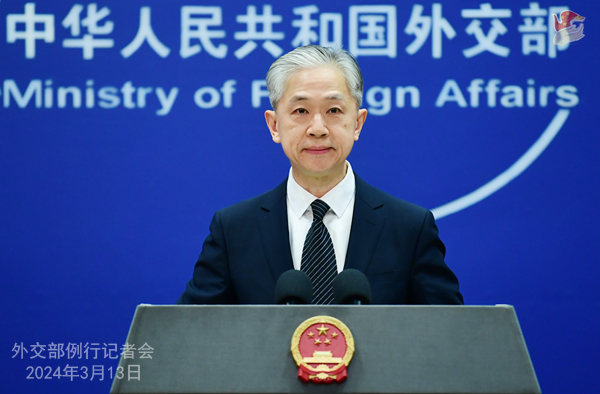
Rudaw Media Network: How was the Middle East represented or discussed during the two sessions? Are there any specific policies, discussions, or resolutions related to the Middle East? My second question is how does China aim to contribute to peace or stability in the Middle East amid ongoing disputes and conflicts?
Wang Wenbin: On your first question, China is a sincere friend of countries in the Middle East. We are closely following the situation in the Middle East and are committed to working with countries in the region to implement the Global Development Initiative, the Global Security Initiative and the Global Civilization Initiative to jointly promote lasting peace and stability in the region. China attaches high importance to carrying out practical cooperation across the board with Middle East countries for higher-quality mutual benefits and greater wellbeing for the people. Deputies and members also made proposals during the two sessions to that end.
On your second question, as the conflict in Gaza keeps escalating with a growing spillover effect, it has wreaked havoc on the Middle East region and the wider international community. When he met the press during this year’s two sessions, Member of the Political Bureau of the CPC Central Committee and Foreign Minister Wang Yi specially elaborated on China’s position on the situation in the Middle East, especially on the conflict in Gaza. He stressed that restoring justice to the Palestinian people and fully implementing the two-State solution is the only way to break the vicious cycle of Palestinian-Israeli conflicts, to eliminate the breeding ground of extremist ideologies, and to realize enduring peace in the Middle East. Looking forward, China will continue to uphold the spirit of the Global Security Initiative, support countries in the Middle East in enhancing strategic independence, working in unity to address regional security issues and building a new security architecture in the Middle East that is common, comprehensive, cooperative and sustainable, and contribute to safeguarding peace and stability in the Middle East and promoting long-standing peace and security in the region.
DPA: Leaders of Germany and the Philippines said in Berlin yesterday that the two countries will deepen military ties. What is the Foreign Ministry’s comment on this?
Wang Wenbin: We hope that cooperation between relevant countries is conducive to peace, stability and development of the region. This is our consistent position.
AFP: It’s reported that US President Biden and former President Trump have earned enough delegates at the latest round of primaries yesterday to clinch their parties’ presidential nominations for this year’s election. Given that China is one of the major topics discussed by US voters, what’s China’s comment on this?
Wang Wenbin: The presidential election is the domestic affair of the United States. China, committed to the principle of non-interference in others’ internal affairs, will not interfere in America’s presidential election. I want to stress that developing China-US relations is in the fundamental interest of our two peoples and two countries and meets the expectations of the international community. No matter who is elected as US President, we hope the US will work with us in the same direction, follow the principles of mutual respect, peaceful coexistence and win-win cooperation, and advance the steady, sound and sustainable growth of bilateral relations for the benefit of the two countries and the world at large.
CNN: I just would like to follow up on the TikTok question. American lawmakers are saying that TikTok needs to be sold. Is the Chinese government taking a role in advising ByteDance on how to proceed?
Wang Wenbin: I have stated China’s position just now. The US’s bullying acts disrupt normal international trade order and will eventually backfire.
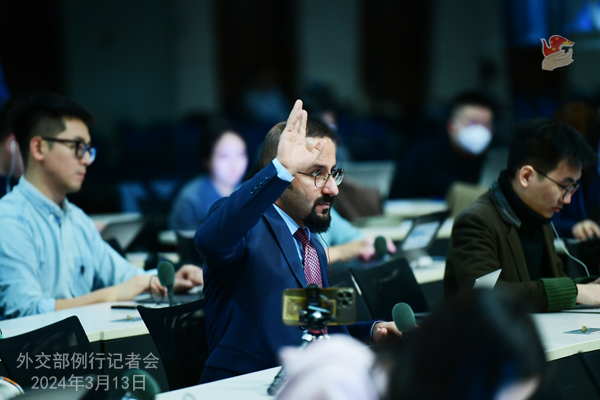
Bloomberg: Secretary Raimondo of the US Commerce Department is in the Philippines right now and she was quoted as saying today that one day Chinese electric vehicles might drive on the US roads if the government could be assured that the software in the sensors of those vehicles didn’t propose a risk to privacy and national security. I know that a number of SOEs and government departments around China have banned Tesla vehicles, for example, for specifically those reasons. Do you agree with Raimondo’s assertion that at the moment Chinese EVs are a threat to the privacy of American individuals and also to national security?
Wang Wenbin: The US has used the so-called data security as a pretext to restrict the flow of data to so-called countries of concern and announce an investigation in connected vehicles of certain countries. These moves are in nature abusing the concept of national security and aimed at suppressing the development of competitive companies from other countries. Hyping up the so-called “China threat” to data security is nothing but fabricating excuses to justify the US’s acts of suppressing China. We hope the US will take concrete actions to safeguard an open, just and non-discriminatory business environment and work with others to formulate universal data security rules and make positive contribution to the orderly and free data flows around the world.
China never abuses restrictions targeting certain countries or certain companies. We welcome companies from all countries and platforms, products and services of all kinds to the Chinese market as long as they conform to the requirements of Chinese laws and regulations.
Reuters: Russian President Vladimir Putin said in media reports that Russia is fully ready for nuclear war and that it will use nuclear weapons if its sovereignty is threatened. Is China concerned about Putin’s readiness to use nuclear?
Wang Wenbin: I’m not aware of the remarks from the Russian side that you mentioned. What I would like to tell you is that in January 2022, the leaders of the five nuclear-weapon states released a joint statement on preventing nuclear war, in which they affirmed that a nuclear war cannot be won and must never be fought. China also noted that this principle has been reaffirmed by the Russian side. China believes that all nuclear weapon states need to embrace the idea of common security and uphold global strategic balance and stability. Under the current circumstances, parties need to take concrete actions and jointly seek deescalation.
The Associated Press: My first question is that Hsiao Bi-khim visited Washington this week. What’s China’s comment? My second question is that social media users in Taiwan have widely shared an AI deepfake video about US Congressman Rob Wittman pledging military support for Taiwan if DPP candidates win the election held on January 13. Rob Wittman accused the mainland of attempting to interfere in Taiwan politics and using TikTok for propaganda. What’s China’s comment?
Wang Wenbin: On your first question, China firmly opposes any form of official interaction between the Taiwan region and the US and is closely following the developments.
On your second question, we will not comment on faked videos. What I want to stress is that Taiwan is an inalienable part of China’s territory. Elections in the Taiwan region are the affairs of a region in China that brook no foreign interference. The US should fully understand the highly sensitive nature of the Taiwan question, stay committed to the one-China principle and the three China-US joint communiqués, and act on the US leader’s assurances of not supporting “Taiwan independence.”
The Associated Press: What is China’s comment on AI deepfake videos and on whether these videos can be used to interfere in other countries’ internal affairs?
Wang Wenbin: We have all along opposed interference in other countries’ internal affairs. And I would also like to point out that the elections in the Taiwan region are the affairs of a region in China, in which no foreign country has the right to interfere.
If you are interested in China’s position on AI, I’d refer you to Member of the Political Bureau of the CPC Central Committee and Foreign Minister Wang Yi’s elaborations on this topic at the press conference held on the margins of the two sessions, in which he proposed three principles.
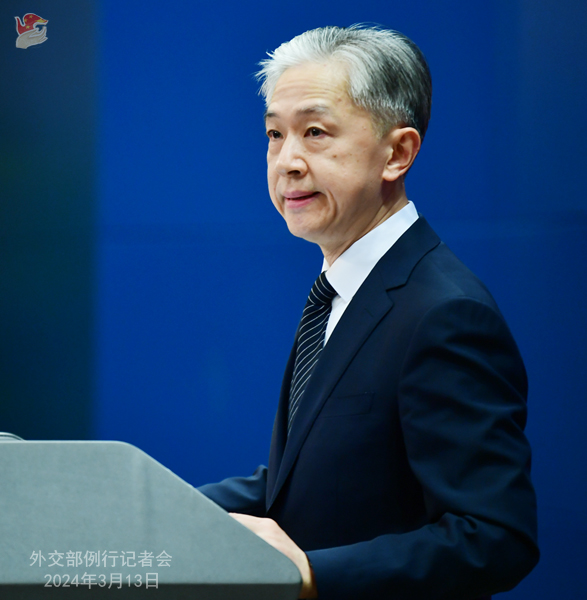
CCTV: US Secretary of State Antony J. Blinken released a press statement on March 12 and said that Ramadan comes at a time of conflict and pain for many Muslim communities, including Uyghurs in Xinjiang, Rohingya in Burma and Bangladesh, and Palestinians in Gaza. What’s your comment?
Wang Wenbin: Xinjiang enjoys social stability, economic growth and harmony among different religions. The human rights of Uyghurs and other ethnic groups there have been fully safeguarded.
It’s Gaza not Xinjiang that suffers from the conflict. It’s millions of Muslims in Gaza not Muslims in Xinjiang that suffer from hunger, deportation and killing.
The US needs to abandon the double standards on human rights issues and stop making political displays on humanitarian issues in Gaza and singularly hindering the UN Security Council’s efforts for a ceasefire in Gaza. What the US needs to do is not to release a hypocritical statement on Ramadan with empty words but take concrete actions to save the lives of Muslims in Gaza.
France 24: I just want to follow up on an earlier question on EVs. You said that China does not target specific countries or industries. China’s potential cognac probe comes as the EU continues its probe into Chinese EVs. Are any of these linked?
Wang Wenbin: In the industrial chain of EVs, parties have inter-embedded interests. China’s success in the EV industry is the success of globalization. China’s EVs are widely welcomed in the world not by using subsidies, but by working to enhance quality and lower costs. This has also contributed to the global green and low-carbon development. We hope that the EU can earnestly abide by WTO rules, follow its commitment to keeping the market open, respect the rules of the market economy, respect the effort made by Chinese companies in making innovations, prudently use trade remedies and jointly uphold the overall economic and trade cooperation between China and the EU.
You mentioned China’s anti-dumping investigation into European brandy. I’d like to add that China is committed to high-standard opening up and upholds the principles of market economy and WTO rules. We stand ready to provide an open, inclusive, transparent and nondiscriminatory business environment for companies from all countries carrying out trade and investment cooperation in China, including those from the EU. This position remains unchanged.
